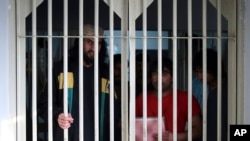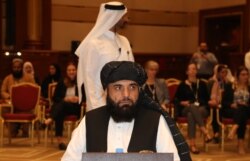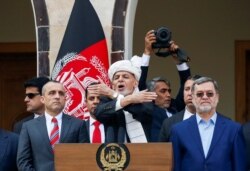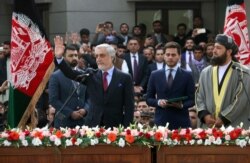The Taliban Wednesday rejected an Afghan government order that allows for the conditional release of thousands of insurgent prisoners, calling Kabul’s move a violation of the accord the Taliban recently signed with the United States.
"It is clearly stated in the text of the (U.S.-Taliban) agreement that all of our 5,000 prisoners would be freed unconditionally and before the commencement of intra-Afghan peace negotiations,” Taliban spokesman Suhail Shaheen told VOA.
The insurgent group is also bound to free from its custody 1,000 detainees, mostly Afghan security forces, according to the deal.
"Now, if they (the Afghan government) do not want to release those 5,000 inmates they are certainly blocking the way to opening intra-Afghan talks,” said Shaheen, who spoke by phone from the group’s political office in Qatar, where the U.S.-Taliban pact was sealed on Feb. 29.
Hours earlier, President Ashraf Ghani ordered a phased release of imprisoned Taliban fighters starting Saturday. The decree called for freeing a batch of 1,500 Taliban prisoners, 100 a day, after receiving written guarantees from each of them that they will not return to the battlefield.
The remaining 3,500 prisoners will be released in groups of 500 every two weeks after the commencement of direct talks between Taliban and Afghan government-appointed teams of negotiators.
Presidential spokesman Sediq Sediqqi emphasized at a news conference in Kabul that the prisoner release was conditioned on a reduction in Taliban violence, opening of intra-Afghan talks and a cease-fire.
"If (the) Taliban wants release of 5,000 prisoners they will have to stop the fighting," Sediqqi said. The prisoner release process will be stopped if insurgent violence persisted, he cautioned.
Shaheen, while speaking to VOA on Wednesday, also outlined the agenda for the intra-Afghan negotiations and when they begin. “
Those negotiations will be about issues such as the formation of a future Islamic government or system in the country, constitutional reforms and reforming (Afghan) security institutions and a permanent cease-fire,” said the Taliban spokesman.
The proposed intra-Afghan talks were originally scheduled for March 10 as stated in the U.S.-Taliban deal; but, they could not begin because of reluctance initially by Ghani to allow the prisoner swap and a deepening political crisis over the legitimate winner of the contentious Afghan presidential vote.
Political feud
The national election commission last month declared incumbent Ghani the winner of the disputed Sept. 28 polls. But his main rival and governing partner in the outgoing government, Abdullah Abdullah, rejected the outcome as “fraudulent” and vowed to establish his own government.
On Monday, both Ghani and Abdullah took part in parallel swearing-in ceremonies, worsening the political crisis and posing a serious challenge to the U.S.-led peace initiative to end decades of hostilities in Afghanistan.
On Wednesday, Ghani and Abdullah issued separate orders, expelling each other from the so-called national unity government that Washington had helped them form to end months of chaos in the country ensuing from the fraud-marred 2014 presidential election.
U.S. special Afghan reconciliation envoy Zalmay Khalilzad has said that Ghani and Abdullah could still work together to end their differences despite their parallel inaugurations.
"The United States supports a united Afghanistan, not a country divided among the Taliban, the government of President Ghani and the government of Dr. Abdullah,” Khalilzad told Afghanistan's Tolo TV in an interview. The station released parts of the interview ahead of airing it in full Wednesday night.
US troop drawdown
Despite the latest political tensions, the U.S. military began withdrawing its forces from the country on Monday to move forward on the peace deal with the Taliban.
Washington has committed to bring home its roughly 13,000 forces from Afghanistan within 14 months, with fewer than 5,000 withdrawn in 135 days. In return, the Taliban has pledged to engage in intra-Afghan negotiations and not allow terrorist groups to use the country for attacks against the United States. “
U.S. Forces Afghanistan (USFOR-A) has begun its conditions-based reduction of forces to 8,600 over 135 days,” said U.S. military spokesman Col. Sonny Leggett, while announcing the plans on Tuesday.
He stressed, however, the drawdown would ensure the U.S. military retains the necessary means and capabilities to provide support to Afghan security forces and conduct counterterrorism operations.







